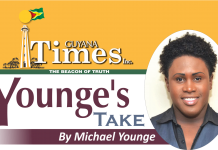This week, President David Granger called on the Georgetown Mayor and City Council (M&CC) to make strident efforts to become unified as they seek to implement projects and proposals to advance the development of the country’s Capital City.
President Granger underscored the importance of the M&CC working within the ambit and framework of the laws while explaining the need for all decisions taken to translate into a “good life” for citizens there.
He was resolute and clear in his address of the need for Georgetown to pursue a path of urban development and commence the return to a Garden City with picturesque landscape and infrastructure.
Among other things, the Head of State who is the second President to visit City Hall, pledged his commitment and support to the council while reminding it that its re-election will hinge solely on its performance and track record.
While his address to the council was welcomed by many Guyanese at home and abroad because of its timing and relevance, it was also severely criticised by those who understood the politics at the M&CC which has been bedevilled by conflicts, scandals, corruption, racketeering and nepotism over the last three decades.
In fact, President’s Granger’s address could be seen as largely ideological and cosmetic because it did not seek to address frontally the main problems facing the new Council, some of which were inherited from the previous body which existed under the PPP/C.
His address should have focused largely on the need to end the endemic culture of corruption, lack of consultation with citizens on core projects to be undertaken that will affect their livelihoods, the wastage and squandering of public funds through the award of questionable and dubious contracts to shady characters, the continued lack of coordination in the reallocation of vendors, and the urgent need to reorganise the city’s tax and revenue collection base.
If the President had adumbrated Central Government’s position on these issues without dictating how and in what form the Council should act, his remarks would have had more meat than bones.
That aside, there should have been some mention of the need to pursue a forensic audit of City Council’s finances, assets and liabilities so that there could be full disclosure on its states and the mismanagement which occurred under the stewardship of former Mayor Hamilton Green that spanned more than a decade.
This would be an excellent starting point on the road to recovery and good governance that the new Council must journey. It would also for once and for all lay bare all financial irregularities and challenges facing the council.
Some argue too, that any forensic audit should speak to the functionality and undertakings of the Town Clerk’s office which appear to have become heavily politicised in recent times.
Also, President Granger could have used the opportunity to explain the importance and role of minority politics on the council while encouraging healthy debate and full disclosure on issues that are of a public nature without the backstabbing, venom and shade throwing.
It would have also been nice to see the President hold talks with the Mayor and Deputy Mayor of Georgetown in an effort to ease the tension between the two who have been at loggerheads over several issues since taking office with the most recent being the Parking Meters controversy which has turned out to be an embarrassment to the entire Council.
Such a meeting could be seen as interference but rather a move by the Head of State to practice mature politics by showing that direct dialogue in the presence of an impartial third party could lead to redounding positive outcomes especially with regards to interpersonal relations.
After all, all acts undertaken by the council will somehow affect its citizens and not just the privileged few that sit around the horse shoe table.
The new Council has a far way to go over the next two years in reshaping the municipal politics of Georgetown and redefining its political culture. In the end, any failure on the part of the Council which is not and never has been incidentally controlled by the PPP/C, will be seen as failure on the part of the A Partnership for National Unity/Alliance for Change coalition.
It is clear now that the “change” citizens who took part in Local Government Elections this year had hoped for remains evasive until a more serious, transparent and prudent approach is taken to development and unity politics.










